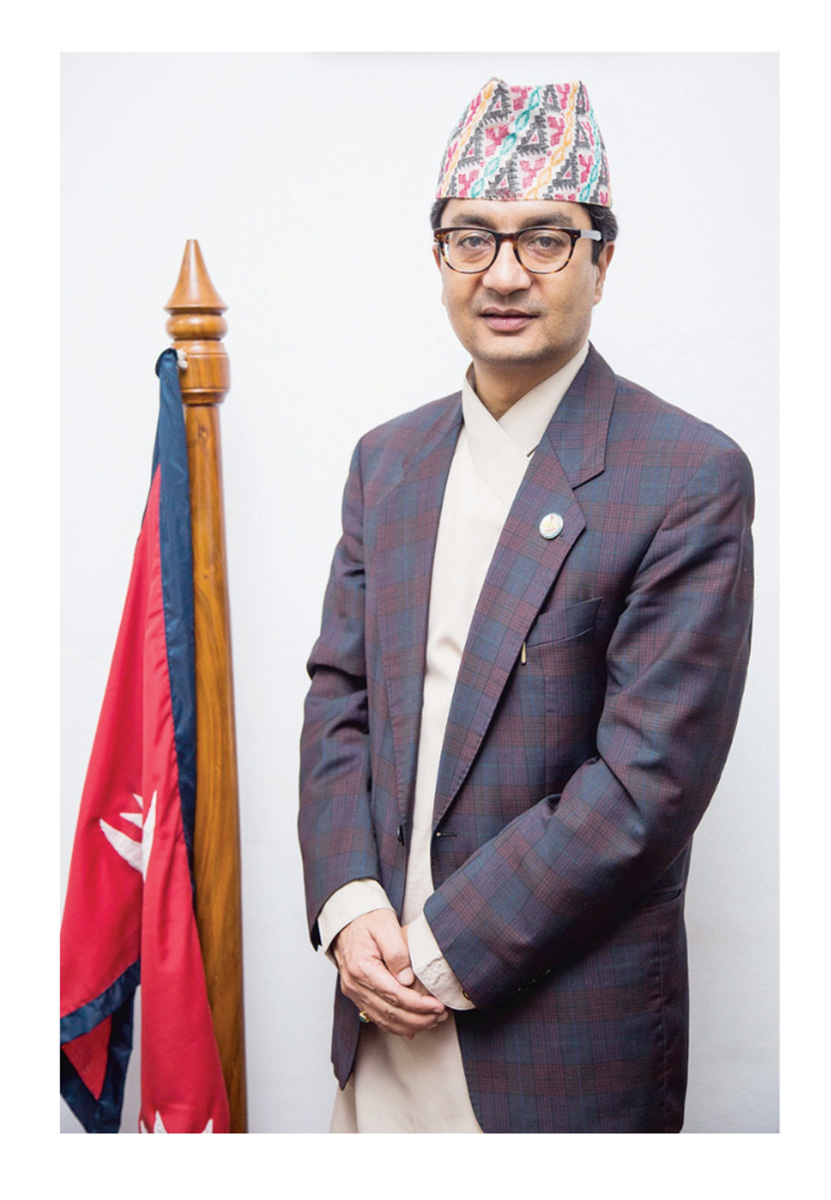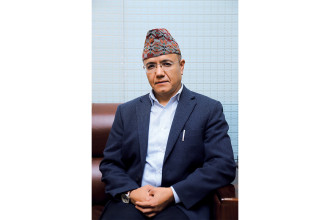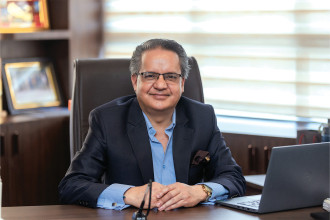
Udaya Rana is the current State Minister of Finance and also a prominent youth leader of the Nepali Congress party, having formerly served as the President of Nepal Tarun Dal. Rana boasts of an illustrious academic career having studied in some of the most prestigious schools and colleges in India and the United States. He received his Bachelors in History from St. Stephen’s College, Delhi University and completed his Masters degree from Cornell University, New York. He completed his high school from St. Joseph’s North Point, Darjeeling and his higher secondary from Lawrence School, Sanawar. During his time in Delhi, Udaya was a longstanding advocate for democracy in Nepal leading protests through the Nepal Student Association. Below he shares his views on leadership and national politics:
Can one contain leadership in a definition?
There is no definition of leadership. For that you will probably have to look it up in the oxford dictionary. A leader, for me, is someone who is able to give direction to a mass. That individual could lead the masses towards good or evil, yet that quality of moving people is leadership.
Do you think the democratic process will enable Nepal to pick a leader who can utilise our resources and push the country forward?
That’s up to the people; it’s up to them who they want to elect. It’s up to the people what kind of party they want and up to them to read the manifestos and learn the ideologies of the parties. At the same time, it is the responsibility of the political parties to be able to convince the people of their ideology. I think the three major parties have their organisation at the grassroot levels, some may be more efficient than others in certain districts, and this may vary from district to district. But at the end of the day, it’s the people and who they want. Unfortunately, what’s happened in the present politics is that there has been a division. Earlier all political parties from different spheres and interests sat and worked things out together, which rarely happens in another country. If you look at America, it is distinctly divided into republicans and democrats, it’s not like here. Here we are very fluid and because of that nature we were able to conclude a peace process, to get the Maoists into the mainstream, which isn’t a joke. We were able to convince the international community that we are not getting onto a terrorist track. This is the brilliance of Nepali politics, politics of coalition and cooperation. However, what has happened now is there’s a clear division that’s been created by the present coalition between these three parties. The choice for the people is: do you want a democratic Nepal or a communist Nepal. So it’s not an election anymore, it’s a referendum. We did not want to give this choice to the people; we wanted them to vote on party ideologies and personalities. That’s not going to happen; its communists vs. non-communists. It’s for the people to decide and especially for the business community to realise where we are heading.
Udaya Rana / State Minister of Finance
Is the communist rise an instance of sheer opportunism or is there substance behind their ideology?
In politics opportunism is not an issue; you have to be an opportunist to have success. But what I fear is that society is going to get divided. Already the CPN-UML has divided the pahadiya community and the non-pahadiya community, and now with this left and democratic division, there could be a further divide between the haves and the have-nots. This in the long-run is going to hurt Nepali politics, society and the economy. I feel this is not the right way to go ahead, but we have no choice. When we were all busy enjoying our Dashain holidays, there was a coup where we were totally taken aback. Now we realise it was not something out of the blue or sudden, it was well-planned, well-oriented and maneuvered. This is a dangerous trend I feel. Already the country is being divided on ethnic lines and now we are going to divide the society between the haves and have-nots, the democrats and the communists. I seriously hope that the people of Nepal realise this is not an election, this is a referendum.
Despite the new coalition and the recent floods, the government has predicted 7.2% growth. What is the basis for this?
With the floods and the landslides, the agricultural output is going to come down. I am not too sure whether or not we will be able to achieve the 7.2% growth rate, but I cannot say that it cannot be achieved. In November and December, the finance ministry has a mid-year evaluation and only after that I will be in the position to tell you the target growth rate for the coming year.
Do you think that rising political stability will create a platform for the youth to embrace leadership - politically and in terms of entrepreneurship?
Yes, I think there is a lot of scope. The average age of a Nepali is 22 years old, one of the youngest populations. There is a huge youth bulge, and if you look at other countries that had a similar position, during that period, they witnessed maximum economic growth. So we should not take this as a threat but as an opportunity. I feel that especially in four areas: water resources, tourism, agriculture and service sectors we have a competitive advantage over our neighbours. Being a landlocked country between India and China, two of the most aggressive economies in the world today, I do not think we can compete in heavy industries but we can focus on these areas in which we have a competitive advantage. I just hope we are coming to a conclusion to the political instability we have had for a long time. Also, I believe that the government must provide infrastructure for business to flourish. If someone puts up a factory we have to ensure there is electricity; that the roads to the factory are good; that the products coming across borders get a rite of passage; that the process is not delayed because the line at the border is too big or the border point too narrow. The government has to concentrate on infrastructure development. If we are able to provide decent infrastructure, not even excellent, not even good, I think the private sector is going to ramp up the economy on its own. The business community knows how to make money, the government doesn’t. Therefore, the government should not try to interfere or poke their nose in places where it is not productive.
Udaya Rana / State Minister of Finance
Were you personally inclined towards leadership or were you inclined due to family ties?
It was both, I was always interested.We have always talked about politics in the house; I think that influenced me quite a bit. Also, when I was in Delhi University, I was the General Secretary of the Nepal Student Association which is a non-political organisation. I politicised that organisation in the sense that we started going outside the embassy, doing marches and demanding democracy in Nepal. My urge for politics started then and was revived when I came back from America. During my father’s elections, I realised that I had an aptitude for dealing with people. Invariably, my dad used to be the candidate but a lot of people behind him used to be following me. I said okay I seem to be doing alright, let’s have a go and since then I have been in Nepal Tarun Dal, starting from the district level, I am now President. This is my journey in politics.
Did studying abroad change your perspective on leadership and what differences do you observe between the political process here and in the West—especially in terms of corruption?
Studying abroad and getting exposure has given me a lot. I have travelled to more than 50 countries around the world. In Delhi, I was in the best colleges that India had. I was in St. Stephens College and Delhi University, which is the number one Arts and Science College in India. I also got a scholarship to attend an Ivy League, Cornell University. Even my schooling was in a private boarding school, which is an elitist school. So yes, my educational background has given me a lot of benefits and most importantly my leaders in the party see that. Because of my education, exposure and family background a little bit extra has always been given to me, it’s not a secret. I think politicians are politicians. Yes, there is corruption in this country, but there is corruption all over the world. I am not justifying corruption, but in Nepal the level of corruption reaches the ordinary people. In most developing countries corruption is limited to a certain level and it really does not affect the average person. A person working in a private firm or in a government office is able to lead a relatively decent, cushioned life with the salary he earns, but it’s not so here.
You have long been an advocate for democracy, how important are empathy and inclusiveness in the democratic process?
If you look at our constitution, I think it is very flexible and broad, especially in the social issues regarding women, ethnic groups, marginalised groups, or dalits. No constitution in the world or definitely no constitution in Asia is as accommodative as the one we have. Unfortunately, this inclusiveness, the PR system, and the directly elected post put together is going to cause problems in stability. It is very difficult when there are so many parties for one to get a majority. You need above 45% of the popular vote and at best even if we go back to the 2015 election where congress got two-thirds (of the popular vote), if we had a PR system then, there would be no party with a clear majority now. We cannot butter both sides of the bread. Since we have made our constitution so inclusive, this has opened the gap for political stability. However, this is a learning process. This constitution is not absolute. Besides the preamble of the constitution everything can be changed. So hopefully, this constitution will have a few amendments now so that we not only obtain social and political rights and freedoms but also encourage economic growth.






-(1)-1752214965.jpg)